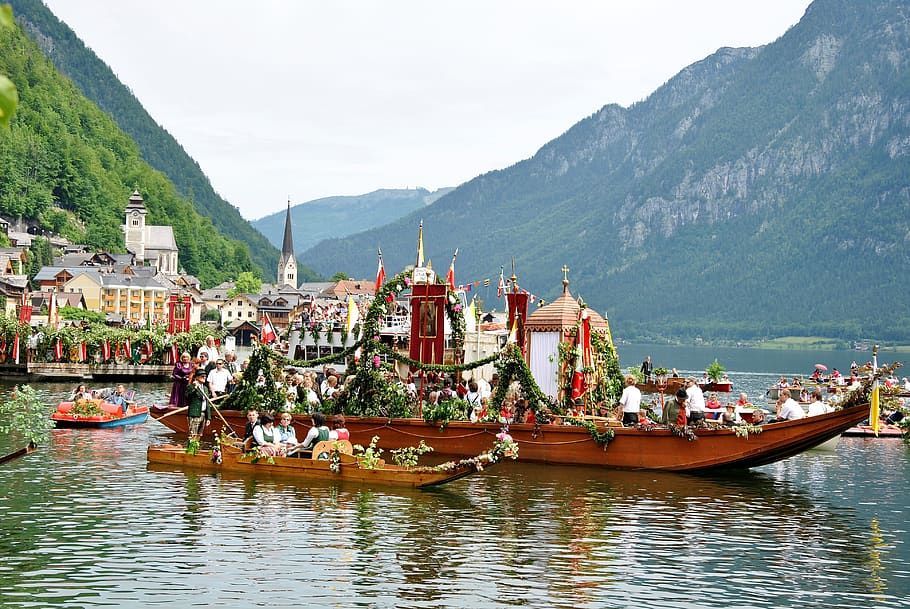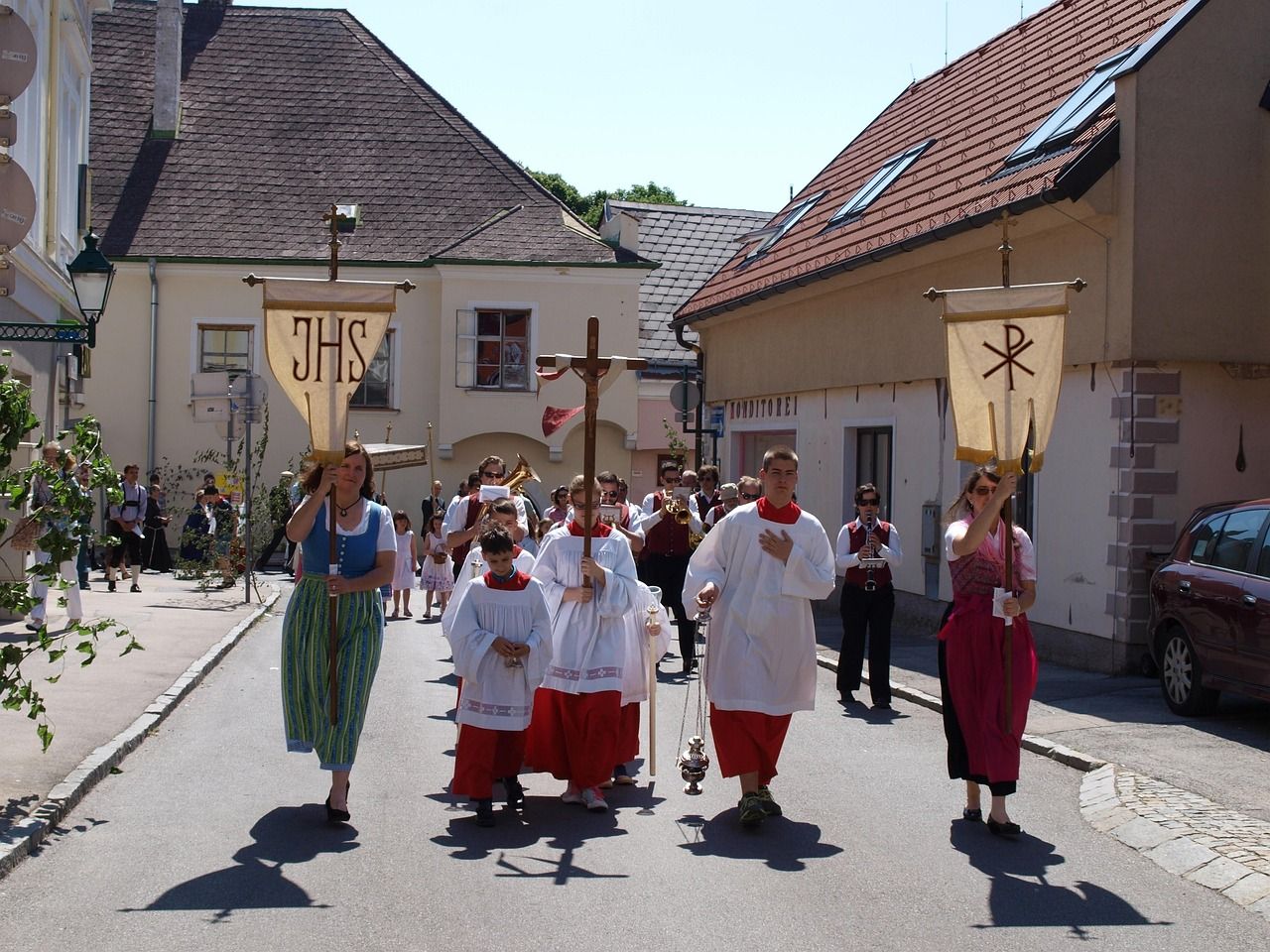Corpus Christi
The Murmuration of the Spirit
Can you keep a secret? Because the Church couldn’t — and thank God for that.
In the early Church, the Catechumens, those preparing for baptism would hear these words after the Gospel and before the Eucharistic Prayer: “Let the catechumens depart. Let no catechumen remain.” These weren’t just words — they marked the boundary between hearing the Word and beholding the Mystery. Only the baptized could stay for what came next: the Eucharistic Prayer and Communion.
For St Ambrose, St John Chrysostom, St Justin Martyr, in fact for the whole community of believers, the Eucharist was their true treasure, they mystery of mysteries, for which they had to be made ready, prepared, understand and prize. The catechumens left because what happened next was something too holy, too intimate, too unspeakably precious. They took Jesus at his word: “This my Body…this is my Blood.” They did as he commanded: “Take, eat, all of you…” They held on to his promise: “I am the bread of life.” They recognized him in the breaking of bread.
Early on they articulated a deep understanding of what they called “the Mystical supper” meant. As the Fathers taught: for Origen, the Eucharist was the “fire of love”; for Ignatius of Antioch, “the seed of resurrection”; for the whole Church, it was the “Sacrament of Unity,” the “Bread of Angels,” the “real flesh of Christ.” And as St. Cyril of Jerusalem insisted, “Since Christ himself has declared the bread to be his Body, who shall dare to doubt it?” The core belief in Christ’s Real Presence in the Eucharist was universally held in the Church for over a millennium. The Eucharist was the Church’s unspeakable treasure of a united Christendom.
secret. Over the course of time it became clear that this treasure could not merely be whispered in the catacombs, kept secret amongst the initiated. “The bread that I will give is my flesh for the life of the world.” As the world woke up to being Christian the Eucharist was taken out onto the streets.
What is this mystery we could not keep to ourselves? It is Manna in the desert — food for a people on the move, for those whose hearts are weary, who walk through dry places and long for home. It is the Bread of Angels, yet given to the poorest hands. It is the Bread of Life, broken for a world that hungers for more than it knows. It is Viaticum, food for the journey, the last gift pressed to the lips of saints and sinners as they pass into eternal light.
It is Thanksgiving — Eucharistía — the whole Church lifted up in joy, even in the midst of sorrow. It is the offering of the world back to God, joined to Christ’s own self-offering. It is the Medicine of Immortality, as St Ignatius of Antioch called it — the antidote to death, the taste of resurrection. It is the flesh of the Word made flesh, the living presence of Christ, not symbol, but reality. It is Christ, truly present, to which we give our “Amen.” And so — we adore. We stand back and celebrate, that Jesus Christ, our Lord and our God, gives himself to us again through the hands of his priests, on the altars of the world.
Because it wasn’t enough to celebrate this mystery in the sacred hour of the Mass. We continue to reverence God with us Christ present in the Blessed Sacrament. What’s more, on this feast the church opens its doors for the world to know the Lord is with us.
I have celebrated Corpus Christi twice this week. Last Thursday I was in a small Austrian monastery in the Alps. Their processions include traditional dress, bands, and banners and gun salutes (Schützen) to announce the approach of the Blessed Sacrament. In Italy streets are transformed with carpets of flowers, and around the world ox-drawn carts, boats and elaborate monstrances bear the Blessed sacrament with brass bands, petals, music and dancing.
In Hereford this morning, and here at Belmont this afternoon we will carry Christ in the Eucharist out under canopies, with incense and song. Corpus Christi is the day the secret spills out of the sanctuary and floods into the world. Once a year we celebrate Christ’s Eucharistic presence in the world around us, because we cannot keep the Lord to ourselves.
But wait, this is not just once a year. Every time we come to Mass and receive the Lord we take him out into the streets of the world in ourselves. We are sent to carry his presence. He who is to be the life of the world, seeks to bless the world through us.
Because the Eucharist, while adored, is also consumed — to change us from within. It is not only for worship but for mission. The Eucharist is not just something we receive — it is the gift that makes us who we are.
As St Augustine said, “You hear the Body of Christ, and you answer ‘Amen’. Be then a member of the Body of Christ, that your ‘Amen’ may be true.” We become what we eat. We are made into the Body of Christ for the life of the world.
To say Amen is to say “Yes”. “Yes, Lord, you are here”. Yes, I will live as one who has tasted heaven. Yes, I will carry your presence into the ordinary streets of my life — into my home, my community, my neighbour, to my enemy, to the hungry, the lonely, and the lost.
Yes, I will live Eucharistically. Yes, I will be broken in love, as you were broken for me.
Corpus Christi is the day the secret becomes a song, the mystery becomes a movement, the Presence becomes a procession. Christ is with us — for the world, for its healing, its feeding, its salvation.
And we today we walk with Him, for he is the life of the world.











